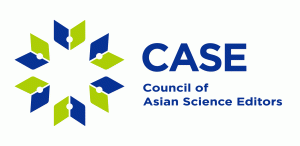The 3rd Asian Science Editors’ Conference & Workshop 2016
July 20–22, 2016, The Korea Science and Technology Center, Seoul, Korea

The 3rd Asian Science Editors′ Conference & Workshop 2016 that carried the theme “Development of Asian Scientific, Technological, and Medical Journals to International Level” was held July 20–22, 2016, at The Korea Science and Technology Center in Seoul, Korea.
The objective of the conference and workshop was to educate on improving the quality of scientific writing and editing and publishing scientific publications according to international standards. It aimed to help scientists, educators, and researchers increase their knowledge of scientific writing and how to effectively review and manage the quality of scientific journals and scientific publications intended for a global reach.
The conference was organized by the Council of Asian Science Editors (CASE) and Korea Institute of Science and Technology Information (KISTI).
The event attracted over 180 participants from 12 countries from the various universities, research and training institutions, scientific publishers, journals, and research and training units associated with scientific journals.
There was a pre-conference workshop on CrossRef’s activities. Rachael Lammey from CrossRef presented a variety of topics such as funding data, ORCID ID, CrossMark, cited-by linking, early registration, event data, clinical trial metadata, and CrossRef’s upcoming work. DOI registration is mandatory for scholarly journal publishers. Therefore, editors are familiar with CrossRef’s work and activities. Editors should be able to learn about the progress of CrossRef’s expanded activities, so the presentation was invaluable to Asian editors. Seonheui Choi introduced KISTI, a new DOI registration agency in Korea. Shivendra Naidoo explained the usage of Similarity Check (CrossCheck) services provided by iThenticate. As a user of CrossRef services, Yera Hur applauded CrossRef’s excellent devotion to editors.
On the morning of July 21 at the conference, digital standards were presented by Lammey from CrossRef, Donald Samulack from Cactus Communications, and Kihong Kim from Ajou University. The topics stressed that editors should understand and adopt digital standards for scholarly publishing such as DOI, JATS XML, CrossMark, funding data, and ORCID. Youngsuk Chi, Chairman of Elsevier’s plenary lecture, was a lucid prospect on science and technology development in Asia and following the promotion of journals from Asia. To reach the higher value of journal brand, he stressed not only high-quality articles but also better access to journal content by adopting information technology for journal publishing. In the afternoon, the topics were local journals in Asian countries and open access.
On July 22, the theme of the post-conference workshop was “How to Produce JATS XML for Asian Journals and Books.” Although it was technical, more than 100 editors participated and listened to the presentation. Hidehiko Nakanishi, president of Naknishi Printing Co. Ltd., explained JATS XML for Japanese language. There should be special functions for Japanese because there were special marks or characters present only in Japanese. In the afternoon, there was a Seoul city tour. Fifteen editors participated in the tour. Although the weather was hot, a delicious lunch at a Korean restaurant in Itaewon, the changing ceremony of palace gatekeepers at Gyeongbok Palace, and interesting history in the palace made the participants satisfied.
The 3rd Asian Science Editors′ Conference & Workshop 2016 was sponsored by Elsevier and Editage Korea (Cactus Group) and supported by Korean Council of Science Editors (KCSE) and Association of Academies and Societies of Sciences in Asia (AASSA). The 4th Asian Science Editors′ Conference & Workshop will be held on July 6–7, 2017, in Taipei, Taiwan.
Photos on the event can be found here:
http://asianeditor.org/gallery/?id=7&mode=view&page=1
